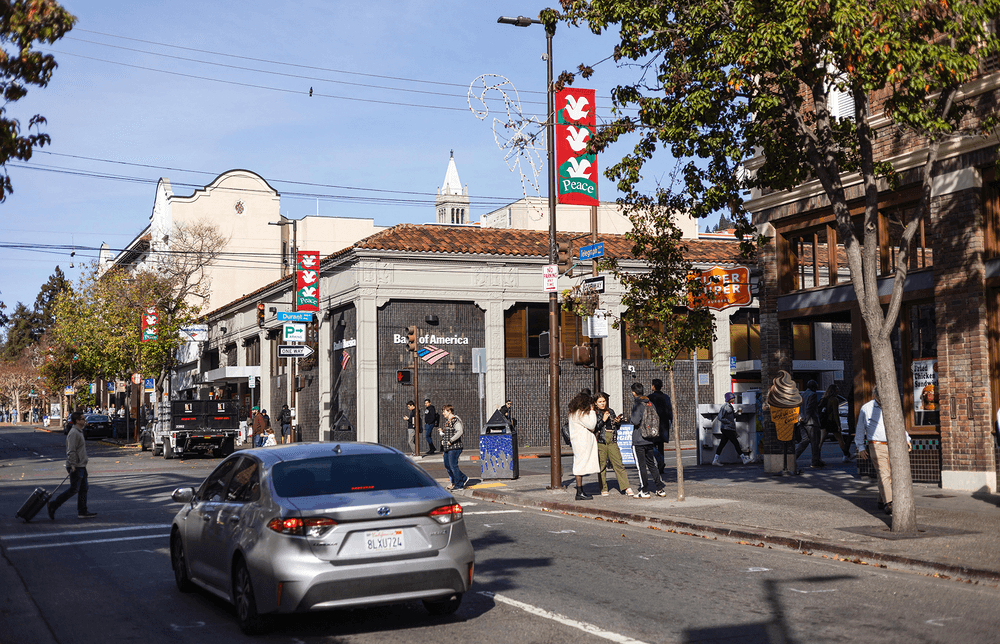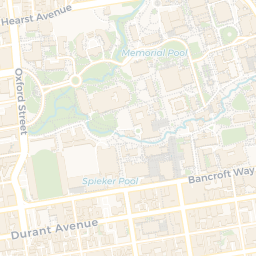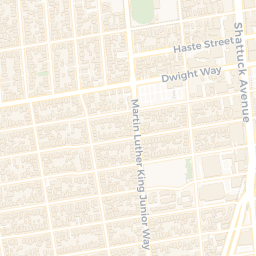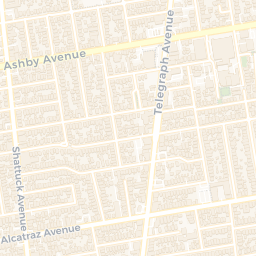Is Telegraph Avenue changing?
Google Maps and business owners weigh in
December 03, 2022

Luke Jensen | Staff
Berkeley's stretch of Telegraph Avenue is no stranger to changing storefronts. Throughout the COVID-19 pandemic, Telegraph Avenue and the businesses that stamp it have seen significant changes.
The map plots businesses that have opened and closed on Telegraph Avenue since March 2020, the start of California's shelter-in-place order.
Green circles represent opened businesses; red circles represent closed businesses and purple circles represent businesses that have opened and closed at the same address.
Data for this map come from Google Maps and Google Street View and may be incomplete.
From Berkeley's southernmost sweep of Telegraph Avenue at Woolsey Street to its northern terminus at Bancroft Way, change is evident. The toss and turn of businesses is most clear close to campus, between Derby Street and Bancroft Way. As students come in and out of their college years, the businesses around them seem to as well.
However, it appears that this constant churn of businesses does not come without some hardship.
'Berkeley, for us, is our home': The restaurateurs behind Finfine are dedicated to reopening in their hometown.
Erica Cardozo | Staff
Finfine had occupied a space in The Village, an indoor mall on the southwest corner of Telegraph Avenue and Blake Street, since 2000. Unfortunately, the Zawdes, the impassioned family and restaurateurs behind Finfine, driven to serve Berkeley high-quality, all-organic Ethiopian food, were set to change course.
The weight of the COVID-19 pandemic was heavy for Finfine. When the first wave of COVID-19 restrictions in California came in March 2020, Finfine closed.
Finfine's reopening was further complicated with the coming demolition of The Village. With the price of storage units and no place to keep their equipment, Finfine's restaurant equipment was destroyed.
“We have to start brand new, from memory,” said Charlie Zawde, Finfine co-founder.
However, for the Zawdes, reviving Finfine in Berkeley is still a fight well worth the trouble.
“It's my passion. It's a family passion,” Zawde said. “We want to do it, and we are Berkeleyans. My son went to school in Berkeley and my daughter, so Berkeley, for us, is our home.”
As a number of other businesses have closed and opened in rapid succession on Telegraph Avenue, it begs the question of whether the hippie, free-spirited core of Berkeley is changing, not just the storefronts that physically compose it.
When asked if Telegraph Avenue and Berkeley are changing, Charlie Zawde initially noted the inevitability of some change. While students are usually in Berkeley for a few years, he thinks Berkeley's residential community is still the same.
“People are still nice. People are still thoughtful,” Zawde said.
Zawde continued to point out that Finfine had been there for 20 years, and things could not have changed too much. After all, many Berkeley staples still occupy their spaces on Telegraph Avenue — among them, Moe's Book and Amoeba Music.
However, Fidel Zawde, longtime Berkeley resident and Charlie Zawde's son, had more to say; for him, Berkeley has seen significant changes.
“Berkeley used to be a local, small city and culture of a bunch of hippies, school students and people who just are there to learn and try to do better,” Fidel said. “Now, it seems like there's a little bit more of a business in terms of trying to get more students to come, get more buildings, get more structures and modernize everything.”
His father agreed.
No matter the changes they see in Berkeley, they're still dedicated to the city. The Zawdes are looking to reopen Finfine, but not just anywhere. Their new location must be within Berkeley's city limits.
Aside from wanting to stay close to home, Berkeley's “organic revolution” aligns with their values.
Berkeley has amassed a number of restaurants and grocery stores replete with organic options. Razan's Organic Kitchen, Chez Panisse and Berkeley Bowl's two locations are among the Berkeley businesses with organic selections.
Finfine is also dedicated to serving an all-organic menu. In that same vein, the multiple farmers' markets across Berkeley were critical for the restaurant. According to Zawde, all vegetables were sourced from trips to Berkeley's farmers' markets.
Zawde's reason for sticking to organic ingredients brought him back to a simple, yet resonant, point about his restaurant and Berkeley.
“My customers are Berkeleyans, and I want to make sure I feed them the best food they can get. It's my passion, and that's why we want to go back to the business,” he said. For Zawde, serving organic food and sourcing from farmers' markets is “part of Berkeley.”
For the Zawdes, Berkeley is not just a host city. It's home, but they also believe its opportunities and history differ from those of other cities. Not every city has multiple farmers markets and an organic revolution — Berkeley does.
The Zawdes continue to look for a new space in Berkeley to house Finfine, and their GoFundMe campaign is still active.
'It's always been like this': Moe's Books owner tells of Telegraph's ongoing change.
Since 1962, Moe's Books has occupied the 2400 block of Telegraph Avenue, wedged between Haste Street and Dwight Way, in Berkeley.
Clarissa Arceo | Staff
Moe's Books opened in Berkeley in 1959. Since 1962, it's occupied the same block of Telegraph Avenue, between Haste Street and Dwight Way.
The business has seen a lot on Telegraph Avenue, and the past few years have been no exception.
Moe's Books is located a few hundred feet from People's Park, a frontier for new student housing. Like many businesses, Moe's Book also launched a GoFundMe campaign in the early weeks of California's shelter-in-place order. In 2021, Moe's Books employees unionized. Most recently, new life has been breathed into a long-term effort to ban cars on Telegraph Avenue.
However, Doris Moskowitz, owner of Moe's Books and daughter of Moe Moskowitz, would say these changes are not out of the ordinary.
“Telegraph has always been a changing neighborhood,” Moskowitz said.
Before the pandemic, Moe's Books was open from 10 a.m. to 10 p.m. everyday. Now, they're open from 11 a.m. to 7 p.m., a four-hour loss.
The store also held events before the COVID-19 pandemic. Moskowitz thinks reopening the store as an event space is a long way off.
More generally, Moskowitz said that the neighborhood today is simply not the neighborhood of the 1970s and 1980s - largely due to “societal changes that are a little hard to name.”
She recalled around three movie theaters close to the store in the 1960s. When she started working there full-time in 1990, she says there were 10 bookstores near Moe's Books. She added that Berkeley Art Museum and Pacific Film Archive used to be right around the corner. For Moskowitz, you can always count on Telegraph Avenue to change, but she maintains that it's not as “cool” as it used to be during the bookstore's earlier years.
No matter how Telegraph Avenue has changed, Moskowitz is thankful for the people who have continued to support Moe's Books.
“It's just one small, independent, family-owned, woman-owned bookstore and needs as much support as it can get,” Moskowitz said. “When the community comes out like that, it means a lot.”
Beyond business
Whether or not Telegraph Avenue is truly changing significantly, some things have surely stayed the same.
Protests against the development of People's Park are alive, as they were decades ago. Many businesses remain in their longtime Telegraph Avenue locations. Organic restaurants and grocery stores still dot the city. And, for many like the Zawdes and the Moskowitzes, Berkeley is still home to their family and to their businesses.
Stephen Young is a projects developer. Contact him at syoung@dailycal.org.
Cameron Fozi is the projects editor. Contact him at cfozi@dailycal.org, and follow him on Twitter at @cmrnfzi.
About this story
This project was developed by the Projects Department at The Daily Californian.
Questions, comments or corrections? Email projects@dailycal.org.
Code, data and text are open-source on GitHub.
Support us
We are a nonprofit, student-run newsroom. Please consider donating to support our coverage.
Copyright © 2022 The Daily Californian, The Independent Berkeley Student Publishing Co., Inc.














